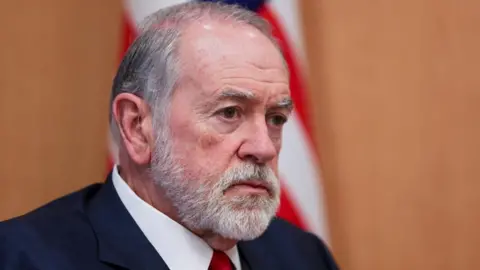In a recent development regarding ongoing tensions in the Middle East, a provocative statement from the U.S. ambassador to Israel, Mike Huckabee, suggests that the United Kingdom might have faced defeat in World War II had Sir Keir Starmer been the Prime Minister at that time. This unflattering comparison comes in light of Starmer’s remarks condemning Israel’s military actions in Gaza, which he labeled as a wrong escalation. Huckabee’s comments highlight the stark divide in opinions on approaches to the conflict between Israel and Hamas.
Huckabee took to social media platforms to voice his discontent regarding Starmer’s perspective on Israel’s planned occupation of Gaza City. He argued that expecting Israel to surrender to Hamas, while hostages are being mistreated, is absurd. “Did the UK surrender to Nazis and drop food to them?” Huckabee rhetorically asked, suggesting that had Starmer been leading during WWII, Britain would be speaking German now. Such inflammatory remarks reflect a controversial stance, visually underscoring the vast chasm in political rhetoric surrounding international conflicts.
The ongoing situation escalated further when Starmer explicitly condemned the Israeli government’s decisions regarding Gaza, urging it to reconsider its military strategy, which he claimed would only perpetuate violence and bloodshed, rather than moving towards peace or the release of hostages. He asserted the necessity for a measured approach to avoid exacerbating the humanitarian crisis in the region.
Following Huckabee’s critique, which was echoed in a repost along with a statement from Starmer, he emphasized the destructive air raids on Dresden during WWII, questioning the necessity for Starmer to critique Israel’s military strategies. Huckabee drew parallels between past wartime conduct and present international expectations, reinforcing his argument that historical surrender tactics are not viable responses to present state security threats.
The backdrop of this heated exchange is the approval by Israeli Prime Minister Benjamin Netanyahu’s security council to take control of Gaza City amidst the ongoing conflict. This controversial decision, amid significant backlash from both domestic and international observers, has drawn heightened criticism, asserting that it will not aid hostages or quell the violence, but will instead lead to greater suffering and displacement.
The international outcry also includes responses from other countries, with Germany halting arms exports to Israel, indicating a growing discomfort with the military strategies employed by the Israeli government in Gaza. In contrast, the U.S. administration has refrained from issuing a reprimand regarding Israel’s actions, indicating a divergence in international diplomatic positions.
Contrary to the critical responses from various quarters, Huckabee’s assertions and the U.S. administration’s passive stance pose profound questions about long-term U.S. support for Israel and its impact on diplomatic relations with other allies. During a meeting between U.S. Vice-President JD Vance and UK Foreign Secretary David Lammy, the role of the U.S. in Israel’s military decisions remained ambiguous, leaving many to speculate on the direction of future policy-making in the area.
Compounding the situation, the escalating conflict has already led to around 61,000 casualties in Gaza, following Israel’s military offensive, initiated in response to an earlier attack by Hamas that resulted in substantial Israeli casualties. As the war continues, the local and international humanitarian crises deepen, prompting urgent calls for a diplomatic resolution.
In conclusion, this exchange between Starmer and Huckabee illustrates not just a clash of perspectives on military actions and client-state responsibilities in international conflicts, but also highlights the wider ramifications of these opinions on British and American foreign policies. The dialectic around military ethics, humanitarian concerns, and the geopolitical realities of warfare continue to evolve, warranting thoughtful discourse and cautious policymaking in the face of one of the world’s most entrenched conflicts.











